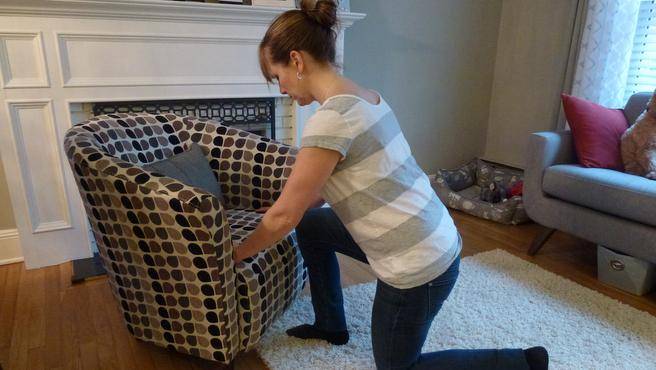Book an assessment with Zoomers now!
Use our online booking tool to find a time that works for you!
50% of seniors who fall sustain serious injuries (such as fractures or head injuries). Some falls can be avoided by receiving preventative physiotherapy for the elderly at home. This care can include education about risk factors, strengthening, and balance exercises; it can also include environment modification. Unfortunately, despite these attempts, falls risk is a challenge that many elderly adults face.
There are many factors that determine whether or not a fall results in injury, including pre-existing medical conditions or injuries, the type of flooring or ground surface, and the height from which the fall happened. Another important factor in determining whether or not you sustain an injury during a fall is how you fall. Believe it or not, there is a technique to falling “safely” and it really does help!
While preventative physiotherapy for the elderly at home can help minimize the chance of falling, it’s also important to be prepared in case it happens to you.
Follow these four steps to minimize the impact of your impact during a fall:
Tuck
Instinct usually causes us to stiffen up when we feel ourselves slip but if you can keep your elbows and knees bent, it will help absorb the impact of the fall and reduce the chance of fracture. Bending your knees and hips also creates a crouch that gets you closer to the ground before the actual impact.
Protect your head
Avoid hitting your head by tucking your chin to your chest if you are falling backward or sideways. Turning your head to the side if you are falling forward can also decrease trauma to the face, jaw, head, and neck.
Find the muscle
Try to land on the meatier parts of your body (thighs or buttocks) to avoid impact directly onto bony prominences like your knees and elbows. If you have to put your hands out to break the fall, try to get your whole palm and forearm on the ground to reduce the stress on your wrist and elbow.
Roll
Use the momentum of your fall to keep your body moving and allow a roll or slide to happen. Your body is more at risk for injury if you try to stop the momentum of the fall once it is happening.
What should you do next? If you have fallen down, it is important to stay still for a moment to assess whether or not you can safely get back up. Start by taking a few deep breaths to let the adrenaline settle. Once you are thinking clearly, if there is severe pain or you feel unable to try to move, call for help and try to keep yourself as comfortable and warm as possible while you wait for help to arrive. If you do happen to sustain an injury with your fall, physiotherapy for the elderly at home may assist you in having a successful recovery.
However, if you feel able to try, slowly start to move your hands, feet, arms, and legs to determine if there is any major injury preventing you from getting up. If you are able to move, roll to your side and rest for a moment. Next, move into the hands and knees position, to crawl over to a stable piece of furniture such as a heavy chair. When you feel ready, put your hands on the chair and lift one leg forward and put that foot flat on the ground, the other leg should stay bent with the knee on the floor. Take a moment to make sure your blood pressure has leveled off and you aren’t feeling dizzy. Rise slowly, using your front leg to do most of the work and your hands on the chair for balance. Slowly turn your body and sit down in the chair.
Rest in this seated position for a few minutes and make sure you talk to someone about the fall — sometimes you can sustain a serious injury and not know it right away. Often people are embarrassed about falling and prefer not to talk about it with family members or friends. However, it is a common issue facing seniors and there are many preventative measures that can be taken with physiotherapy for the elderly at home to reduce your risk for future falls and/or manage the consequences of a recent one.
If you are interested in finding out more about fall prevention or would benefit from help recovering from a recent tumble, book an assessment with a Zoomers physiotherapist to get started.
Book an assessment with Zoomers
Use our online booking tool to find a time that works for you!


